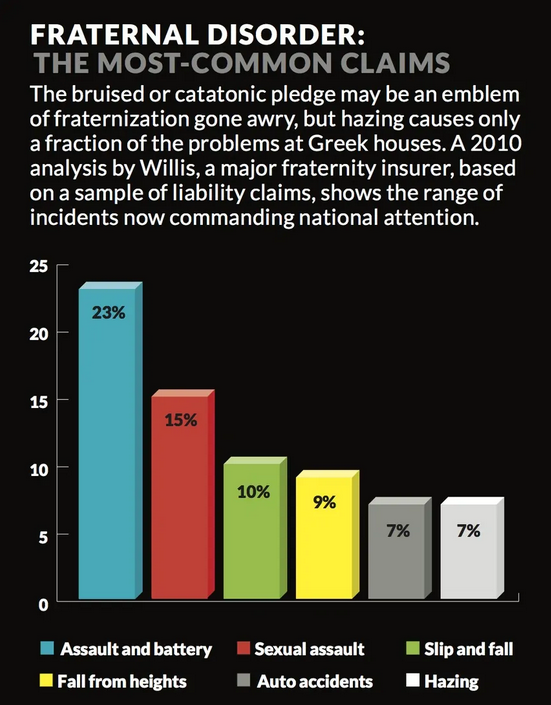What does Litb mean for Alpha Chi Omega?
Love in the bond (LITB), Alpha Chi Omega.
For more than 200 years, sororities have been a focus of attention on American college campuses: for parents, for their promises to make future leaders out of their sons; for young men, for their legendary parties; and for universities, for being sources of funding and bureaucratic relief. However, what began as meeting organizations to motivate the discussion of sensitive issues among young people has been deforming into a vicious circle of impunity in the face of deadly hazing and sexual assaults.
What does Litb stand for DG?
Loyally in the Bond (letter closing)
What are the letters for Alpha Chi Omega?
Alpha Chi Omega (ΑΧΩ, also known as Alpha Chi or A Chi O) is a national women’s fraternity founded on October 15, 1885.
Is Alpha Chi Omega a top tier sorority?
Alpha Chi Omega (“AXO” or “A Chi O”) is a mid-tier sorority with a widely varying reputation. AXO girls are generally not considered terribly hot or popular, but they are respected for being classy and involved in campus life. Despite their relatively low profile, AXOs are considered down-to-earth and genuine.
What does ITB mean in DKE?
The ITB slogan first developed as a statement of solidarity in fraternities and stood for “in the brotherhood.” Sororities borrowed the initials choosing “in the bond” as a more feminist interpretation for their all-female membership.
What is the most elite sorority?
The Most Prestigious Sororities Across the Country
- Biggest: Chi Omega.
- Most Historic: Alpha Kappa Alpha.
- Most Celebrity Alums: Kappa Alpha Theta.
- Most Devoted to Public Service: Delta Sigma Theta.
- Oldest: Alpha Delta Pi.
- Best Sorority House: Phi Mu.
- Most Undergraduate Chapters: Alpha Omicron Pi.
Sectarian, elitist, mysterious: for several hundred years a handful of student fraternities have been home to the future greats of the world. Inspiring envy, sometimes devotion, fear and even hatred, their stories are full of anecdotes that have yet to reveal all their secrets. “Vanity Fair looks at the seven student societies that will continue to place their offspring at the highest levels of power and society.
In the United States, going to college is not only a stressful time for parents’ and students’ bank accounts, but also a period of transition to adulthood and approaching the long-awaited American dream. It is not uncommon to find videos on YouTube with thousands of views of prospective students showing their reactions to discovering whether they have been admitted to the prestigious private universities of the Ivy League -a conference of the eight best private universities in the country, among which are the well-known Brown or Harvard universities-.
For a whopping $11,000 a year on average at public universities and $50,000 at private universities, young people from all 50 states in the country spread their wings to leave the nest and settle on campuses that are sometimes on the other coast or in rather inhospitable locations. For example, the University of Arizona – known for its basketball team – is in the middle of the desert, near the Mexican border. But these don’t seem to be inconveniences for students; the college life the campuses offer far outweighs these minor inconveniences.

It is at this point that the role of the sororities comes into play; if it weren’t for them, many would seriously question whether spending four years of their lives in the middle of the desert studying is worth it. Sororities, in addition to offering their members the opportunity to develop skills and aptitudes to become “better people” and future leaders of the biggest companies in the country, promise the best parties and college experiences. And yes, these parties are just like the ones in Hollywood movies: Greek letters in giant mansions, red glasses, unlimited beer, concoctions that will make you forget the night and lots of women.
But behind what are presented as innocent college parties there is much more. Sexual harassment, machismo, homophobia, racism, violence, humiliating hazing and outrageous amounts of money are behind many of the sororities. Against this backdrop, fraternities are in the spotlight and their survival hangs in the balance.
From secrecy to debauchery
In 1750, the first student secret society was founded in a colonial setting at the College of William & Mary: Flat Hat Club (FHC), the Flat Hat Club. This was just a cover name so as not to reveal its true identity; the acronym actually stood for “fraternitas, humanitas et cognito”, Latin for ‘brotherhood, humanity and knowledge’.
Its intention was to promote the discussion of topics that in the public spaces of the university were vetoed and to foster the ability of young people to think for themselves and expand their knowledge. The fraternity, therefore, was an accidental by-product of what was originally a purely educational mission. These secret organizations used to meet in taverns and, between chats and beers, students bonded with their colleagues, which eventually stimulated trust among them in more than academic matters.
At this same university, during the American Revolution, the first Greek-lettered organization, Phi Beta Kappa, was founded in 1776. Initially, it was also created as a secret organization under the name Societas Philisophiae – ‘society of philosophy’ – but the club soon became known by its three Greek letters. This organization presented itself as a somewhat more serious and intellectual club than FHC, with a certain elitism surrounding its membership. To achieve this, it emphasized the value of rhetoric, writing, and chivalry. This was followed by other organizations, such as Kappa Alpha, Sigma Phi or Delta Phi.
These secret organizations soon became the object of social criticism as an anti-Masonic sentiment emerged among the public after the disappearance in 1826 of William Morgan, a disgruntled Mason who tried to uncover the secrets of the sect. The secrecy that so characterized the university brotherhoods was soon no longer seen as interesting, but rather disturbing, since the similarities with Freemasonry were undeniable. For example, Phi Beta Kappa’s motto, “Friendship, Morals, and Literature,” bore an obvious resemblance to Masonic principles, “Friendship, Morals, and Brotherly Love.” Moreover, the model of expansion that the brotherhood adopted in opening chapters in 1780 at Yale and in 1781 at Harvard appeared to be inspired by the Masonic model. Despite its resemblance to the cult, the traditions of Phi Beta Kappa have been passed down to more modern brotherhoods, and oaths of secrecy, secret greetings, initiation rites, mottoes and insignia are still seen.
Given the circumstances of the time, sororities were merely the product of the American elite, composed of white, Christian men. But, with the advent of women on college campuses, World War II and the civil rights movement, the conception of sororities began to alter. On the one hand, typical white male organizations continued to evolve, while at the same time new types appeared that sometimes resembled the ideals of the early fraternities and at other times clashed head-on with them.
In 1978, John Landis’ comedy Animal House -released in Spain under the name Desmadre a la americana-, although it was actually a criticism of the fraternities, made their popularity levels reach unprecedented levels. Alcohol, legendary parties and fun combined with the idea of being able to reach the most aspired professional positions aroused the interest of even the most demure students.
Sex, alcohol and hazing
About 11% of incoming freshmen report planning to join a male sorority – fraternity – or female sorority – sorority. It is important to differentiate between the two types of sororities, as there is a common misconception that both genders cannot be united under the same sorority. The North American Conference of Fraternities (NACF) states that gender segregation is vital “to develop men of character and empower women.” This sexism, however, is often overshadowed when attention turns to studies that claim fraternity members exhibit higher levels of leadership and success than other students.
In fact, it has even been claimed that having a high grade point average and having been president of a fraternity is valued much more positively by companies such as Goldman Sachs than having the highest grade point average and having become independent when entering college. This is also why Forbes magazine published a list of the most successful fraternities. It seems hard to ignore the reality that belonging to a fraternity opens the door to a promising future.
But selling fraternities to the public as a pledge to stardom and sidestepping many of their other aspects comes at a very high price, as they represent not only a way of acting, but also a way of thinking. Male chauvinist, homophobic and anti-minority values characteristic of the 20th century – the peak time for the founding of Greek sororities – are embedded in those who will be the future leaders of the “most powerful country in the world.” Sororities have indeed succeeded in filling the social void that campus life represents, but this has come at the cost of presenting membership to young people as young as 18 as a cudgel of power and elitism, with an ominous sense of the us versus the them that protects and empowers its members to do whatever they want whenever they want with impunity.

Proof of this is the high number of sexual abuses on U.S. campuses: one in five young women college students are sexually abused during their studies. While it would be unfair to hold fraternities entirely responsible for this situation, their members are three times more likely to commit rape. This reality has been reinforced by Delta Kappa Epsilon’s performances at Yale, in which prospective members of the Greek organization appeared in a video chanting “No means yes; yes means anal.” Having young people chanting phrases that openly incite rape at one of the most prestigious universities on the planet is disturbing to say the least.
Upon arrival on campus, young students are warned about fraternities to avoid at all costs. Among them is the legendary Sigma Alpha Epsilon – whose acronym matches its unofficial name, Sexual Harassment Expected – whose banners hung from the facades of their mansions read “Thank you for your daughters” or “We will teach your daughters what the college could not.” But this is not the only fraternity with an ingrained view of women as mere sexual objects; the vast majority tend to take advantage of the fact that the alcohol that enters the doors of their houses is not controlled and that sororities are prohibited from consuming alcohol in their buildings to do with the young women who come to their houses to enjoy college life whatever they want once they are unconscious.
At this point, it would be wrong to deny that the power fraternity boys think they have over women is strongly linked to the idea of masculinity that Greek houses promote. Being a man means being able to consume inhuman amounts of alcohol, having a long list of women one has slept with, and demonstrating determination and bravery. This is why many of the initiation rites – tests in which prospective members demonstrate why they should be accepted into Greek society – are based on hazing that exalt these values.

Rookies are forced to consume crazy amounts of alcohol, resulting in many ending up, hopefully, in the emergency room with alcohol poisoning. In addition, under the influence of alcohol, these young people are capable of doing almost anything, from eating tortillas made with vomit to swimming in pools full of excrement. If they do not comply with the demands or do not reach the expected level, they are penalized by, for example, being put in a cage while the rest of the fraternity members urinate on them.
More power than we think
The reality is that it doesn’t pay for universities to handle these cases. First of all, admitting that there are rapists among their students would damage their image, which would have a negative impact not only on their prestige – and the income it brings them in the form of donations – but also on the number of applications for admission and, therefore, on their direct profits. Moreover, when it comes to athletes – as in Lizzie’s case – pursuing the rapist is even less attractive, as they are also a crucial source of revenue and prestige for universities.
Although universities such as Harvard have already begun to ban single-sex Greek-letter organizations, the vast majority cannot afford this luxury, as they are bureaucratically and financially dependent on them. Getting rid of sororities would mean that universities would have to take over the housing of students – one in eight currently lives in a Greek house – and they would lose many of the generous donations that former members and family members make to their alma mater.
However, the fight against the tradition of impunity and lack of control in the fraternities cannot be the responsibility of the universities alone; a large part falls on the government as well. A reform of the U.S. Constitution and the interpretation of the First Amendment on freedom of association should be undertaken, as sororities have been protected under this amendment for years. It is safe to predict that this is not going to happen in the near future; fraternities have an inordinate amount of influence over the government and the Senate. Not only do they have direct representation on Capitol Hill, but the CNAF donates to presidential candidates who support their survival.
But it is not all about economic interests; it is about something much bigger, a sense of belonging and camaraderie that cannot be bought and that represents the values of a very powerful and conservative sector of American society. As long as more than 75% of U.S. Senators are members of fraternities and the mentality of Greek organizations is shared at the highest levels and most important institutions in the country, there are few alternatives.
What is the prettiest sorority?
Without further ado, the top 10 best-looking sororities in the SEC:
- Kappa Delta – University of Georgia.
- Zeta Tau Alpha – University of Florida.
- Alpha Omicron Pi – University of Georgia.
- Phi Mu – University of Alabama.
- Kappa Delta – Ole Miss.
- Delta Delta Delta – University of Kentucky.
- Delta Gamma – University of Missouri.
What is slating in a sorority?
Every member organization has its own way of selecting officers, but most organizations use a slating process, which means that Chapter members come together to choose officers from candidates who have asked to be considered for positions.
Who are famous Alpha Chi Omegas?
Alpha Chi Omega (Alpha Chi)
- Carol Duvall – Host of the Carol Duvall Show.
- Alyson Hannigan – Actress.
- Agnes Nixon – Four-time Daytime Emmy Winning TV Writer & Producer.
- Condoleezza Rice – Former Secretary of State.
What is a Lyreman?
A lyreman is kind, supportive, and encouraging to all women of the house, but more importantly all women. As lyreman of Beta Chapter of Alpha Chi Omega I have strived to do just that each and everyday.
Is Alpha Chi Omega a sorority or fraternity?
Officially a women’s Fraternity, Alpha Chi Omega uses the term because the word “sorority,” coined in 1874, wasn’t widely used at the time of our founding.
